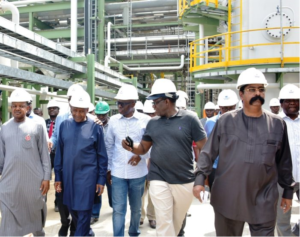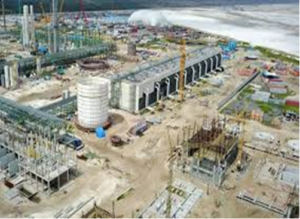Lagos State governor, Mr Babajide Sanwo-Olu, has commended the Dangote Group for building the biggest investment in the country in Lagos State, and for the positive development which the Dangote Oil Refinery and Dangote Fertiliser Complex would bring to Lagos and the Nigerian economy.

President of the Dangote Group, Aliko Dangote, on his part thanked the governor for his support and for making Lagos a haven for investors and said the Dangote Group would do its best to make the Epe axis a hub of industrialisation through job creation and other economic empowerment activities.
The governor, during a facility tour of the Dangote Oil Refinery, Petrochemical Complex, Fertiliser Plant and Subsea Gas Pipeline Projects at Ibeju-Lekki at the weekend, said the refinery and fertiliser projects would meet the yearnings of Nigerians, and also bring exciting times ahead for the government.
Sanwo-Olu was received by the President/CE Dangote Industries Limited, Aliko Dangote; Group Executive Director, Strategy, Capital Projects & Portfolio Development, Dangote Industries Limited, Devakumar Edwin, and the Chief Operations Officer, Dangote Oil Refinery Company, Giuseppe Surace, who guided him and his top officials around the vast complex.
The governor, who said he was impressed with the progress of the projects, noted that Dangote had taken into account gender inclusion and secured the future of the youths in the host communities, in Lagos and Nigeria in general. On his part, he pledged to complement the efforts of the Group and boost infrastructure with adequate road networks.
He further thanked Dangote for his investments and stated that the Lagos state government would create an enabling environment to foster a symbiotic relationship.
To allay the fears of Nigerians, Sanwo-Olu said “for all those who are doubting, the Dangote refinery is activated, the fertiliser plant is activated, and these investments will rejuvenate the entire Ibeju-Lekki-Epe trade corridor.” The governor said, “This is an exciting time for government; fuel shortage will be a thing of the past with the Dangote Refinery.”
He further stated that due to the level of development already seen regarding the refinery and petrochemical plant projects, MDAs of the Lagos state government will be relocating offices to the Lekki corridor, jobs are already being created by the Dangote Refinery and Fertiliser complex, and government can see all these and has to encourage it. “The state government will also ensure that the master plan for the free trade zone is followed”, he added.
Dangote, on his part, noted that even before being commissioned, the Dangote Refinery and Fertiliser projects have created around 20,000 jobs for Nigerians, intending to do more.
He said the Dangote Industries Limited appreciates its host communities across the group and would boost the fishing industry in the Lekki area by providing boats and jobs within the projects to boost local income. He noted that the Group has met and exceeded the expectations of the local community.

He added that in a bid to boost local infrastructure and complement the efforts of the government, the Group would begin road construction and rehabilitation in May even before any formal agreement is signed.
This will be done with the support of the Executive Order, ‘Road Infrastructure Development and Refurbishment Investment Tax Credit Scheme Order 2019 No. 007 of 2019’.
Dangote refinery is a 650,000 barrels per day (BPD) integrated refinery and petrochemical project in the Lekki Free Zone in Lagos, Nigeria. It is Africa’s biggest oil refinery and the world’s biggest single-train facility. Dangote Oil Refinery, a company owned by the Nigeria-based Dangote Group, developed the project with an estimated investment of $12bn.
The Dangote refinery will process a variety of light and medium grades of crude to produce Euro-V quality clean fuels including gasoline and diesel as well as jet fuel and polypropylene.
The integrated refinery and petrochemical project is expected to generate 9,500 direct and 25,000 indirect jobs.
According to reports obtained by Nigeria News Abroad, the refinery is estimated to hold 37 billion barrels of proven oil reserves in Nigeria.
While Nigeria is the second richest oil-producing country after Libya, she is dependent on imported refined fuel products due to a lack of domestic refining capacity.
The Dangote refinery will increase Nigeria’s refining capacity two-fold and help meet the increasing domestic fuel demand while generating foreign exchange through exports.
The refinery complex is developed on a 2,635ha site on the Lekki Free Zone near the Lekki Lagoon, along the coast of the Atlantic Ocean. The geographical location of the refinery is ideal for easy transhipment of refined petroleum products to the international markets.
Dangote has already built a jetty near the project site to receive heavy equipment for the refinery construction.
The processing facilities for the Dangote refinery include a crude distillation unit (CDU) and associated facilities, mild hydrocracking (MHC) unit, a residual fluid catalytic cracking (RFCC) unit, a naphtha hydrotreater, and a gasoline hydrodesulfurisation (HDS) unit as well as alkylation units.
The refinery complex also houses sulphur recovery and hydrogen generation facilities and a polypropylene unit. Comprising two steam methane reformer (SMR) units, the hydrogen generation facility will generate 200,000Nm³/h of hydrogen and steam to produce sulphur-free fuels. The refinery is designed to produce up to 50 million litres of gasoline and 15 million litres of diesel a day and 10.4 million tonnes (Mt) of gasoline, 4.6Mt of diesel, and 4Mt of jet fuel a year.
It will also annually produce 0.69Mt of polypropylene, 0.24Mt of propane, 32,000t of Sulphur, and 0.5Mt of carbon black feed.
The infrastructure facilities for the refinery complex include a pipeline system, access roads, tank storage facilities, and crude and product-handling facilities.
A marine terminal, including a breakwater, jetty and harbour, has also been developed as part of the project.
Other facilities developed to support the project include an administrative building, guardhouses, fire station, and pump stations. The refinery complex will also house a fertilizer plant, which will utilize the refinery by-products as raw materials.
A group of local and international banks led by Standard Chartered Bank provided a $3.3bn syndicated loan facility for the project. The United States Trade and Development Agency is providing an N251.3bn ($0.997m) training grant for the human resource development for the refinery operation.
Engineers India is the engineering, procurement, and construction (EPC) contractor for the project. Honeywell UOP was contracted for the supply of catalyst regeneration and dryer regeneration control systems, column trays, heat exchanger tubes, a modular CCR unit, and catalyst coolers among other equipment.
C&I Leasing was contracted for providing transportation and installation services for mooring systems and subsea pipelines of the refinery.
Hang Xiao Steel Structure Company received a $112m contracts to provide steel structure for the refinery. Jan De Nul Group was engaged in carrying out land reclamation works.
MAN Diesel & Turbo was contracted for supplying two compressor trains, while Air Liquide Engineering & Construction was contracted for supplying the SMR units.
Fabtech (18 columns), Schneider Electric (process automation systems), SOFEC (Catenary Anchor Leg Mooring buoys), and WABAG (raw water treatment plant) are the other suppliers involved in the Dangote refinery project